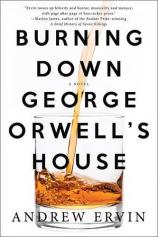Burning Down George Orwell's House
Review
Burning Down George Orwell's House
Ray Welter hit a high point in his career with his Oil Hogg ad campaign at the agency he worked for in Chicago. In a gutsy reverse psychology sort of move, it was meant to appeal to those Americans who didn’t like Big Brother-type government controls, those SUV drivers who felt liberated enough to say, “Screw the environment; I’ll drive this gas guzzler if I want.” Shortly thereafter, Ray hit a low point in his life. For some reason, success wasn’t what he’d hope it would be and he began drinking too much, spending too little time at home and too much time away from his wife. Thus, Ray found himself facing a sheaf of divorce papers. He decided that he needed to get away and rethink his future. That’s what brought him to the isle of Jura off the west coast of Scotland.
Ray had long revered George Orwell’s NINETEEN EIGHTY-FOUR. He’d also heard that the people of the Hebrides were famous for their hospitality. As luck would have it, the house in which Orwell wrote his most famous novel, Barnhill, was available for lease. So Ray snapped it up and off he went to Jura. Well, first off, the island residents’ reputation didn’t live up to their legend, for they had Internet access and knew all about their new visitor’s background. In truth, they didn’t much care for tourists of any sort. Ray’s peaceful getaway was turning out to be not so peaceful after all. At least, Jura’s single malt scotch production didn’t fall short of his expectations. He stocked up on a generous supply of 10-year-olds, 18-year-olds and other bottles of varying ages.
"Besides the sheer entertainment that BURNING DOWN GEORGE ORWELL’S HOUSE provides, its value comes in its power to make readers stop and take a close look at their own priorities."
Barnhill exceeded all of his hopes, yet fell short of accomplishing its intended mission. Ray remembered, too late, that he didn’t much like being alone. The days spent isolated at the far end of the island were, well, lonely. Plus, the Scottish weather remained brooding and soggy, so the anticipated hikes kept getting put off. And it became clear early on that Ray’s expensive Chicago boots weren’t up to the task of keeping his feet dry or blister free. To make matters worse, someone --- or something --- was intent on leaving eviscerated “gifts” outside his door. So, while trying to sort out what he wanted to do when he sobered up, he found he had to deal with unfriendly locals, endless muddy roads wearing perpetually sodden boots, bloody entrails on his front steps, and the occasional drop-in teenage girl with a surly attitude and a murderous father. But Ray took it all in stride and, despite himself, actually learned some valuable lessons. Still, he didn’t go home without a few scars.
Ray’s journey, while not long and drawn out, allowed this man-gone-sideways some much-needed space to consider where he went wrong and how to find his path to happiness. He might have let himself be carried along a road to his own destruction now and then. But, when it counted, would he make the right decision?
Andrew Ervin’s debut novel could be called a meditative story, but it is also a comedic hoot. Ray was ripe for redemption, and, while his choice of salvation seemed odd, it quite possibly was the perfect one for him. The Jura characters couldn’t be more unique or more fun --- or more dangerous. It’s certainly possible to take a wrong step around at least one of them and never make it back. For certain, it’s easy to get on the wrong side of their temperament. As Ray discovers, often friends are found in the most surprising places.
Besides the sheer entertainment that BURNING DOWN GEORGE ORWELL’S HOUSE provides, its value comes in its power to make readers stop and take a close look at their own priorities. What, after all, is really important in this life?
Reviewed by Kate Ayers on May 22, 2015
Burning Down George Orwell's House
- Publication Date: April 12, 2016
- Genres: Fiction
- Paperback: 288 pages
- Publisher: Soho Press
- ISBN-10: 1616956526
- ISBN-13: 9781616956523





